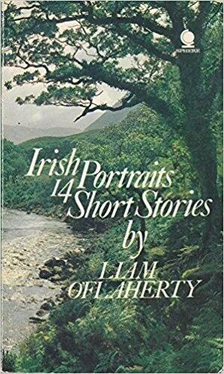At last the ominous sound came. The auxiliaries stopped whispering. Cleary became absolutely numb with terror. The door opened. Cleary did not look up. He heard the slow irregular heavy footsteps approach. He felt the gentle tip on his shoulder and he heard the priest’s asthmatic breathing over him. He rose immediately, and as he followed the priest’s broad black back, he cast a hurried glance around him. The three faces were watching him, with terror in their eyes, but also with a peculiar warning look, as much as to say: “You know what you’re going to get if you tell.”
The father director’s room was across the passage. Cleary was always terrified of that dark door that seemed to lead to a tunnel. On Saturday nights they all waited outside the door and entered into its lamplit gloom to kneel at the little prayer stool beside which Fr. Harty sat, hidden in darkness, hearing their confessions. Now it would be another sort of confession, a more terrible one.
Fr. Harty never spoke until he had lit the lamp and sunk into his easy chair by the fire. Then he put his head between his hands and rubbed his face from the temples to the chin with the peculiar melancholy movement that was customary with him. Cleary standing erect by the door felt pity and love for him. He was tender and kind to him, that priest. Why was he now afraid of hirn? But it seemed now that some other being was sitting in the chair instead of the good priest, who had once been a great athlete and a heavy drinker. This middle-aged man with the red face and the terrible mental suffering stamped on his red face was like an extraordinary and terrible being, merciless, insane, overpowered by a monstrous fanaticism that licked all tenderness and understanding out of his consciousness like a devilish flame licking up the tender moisture of humanity, leaving only the crusted charred bones of the dogmas that had brought that constant suffering into his face. This was not Fr. Harty but a terrible fanatic.
Cleary was only sixteen. He had not yet begun to think out his own experience. Until now he had assimilated without question all the precepts that were offered to his mind, in. the lecture rooms, in the chapel and in the study, where Fr. Harty gave sermons on personal conduct and the lives of the saints. Cleary’s mind was hitherto just a receptacle for all these precepts and he had shrunk away in terror from any personal thought, lest it might lead him into doubt and sin. But now his consciousness had been completely roused by his terror and this first questioning of the justice of the situation in which he was placed. His superiors were not just, something suggested to him. And almost immediately his mind had begun to think independently and he doubted the wisdom of his superiors. And then a little wall had thrust itself in front of his own personality, and for the first time in his life he found himself standing behind this wall, ready to fight his superior. This was an enemy sitting in that chair. Not Fr. Harty whom he loved but this embodiment of the terrible dogmas that made men do such cruel things, as this terrible torture of a youth, this fanatic. That was his enemy. With the extraordinary instinct of youthful persons whose judgments are not deflected and obscured by elaborate reasonings he could see this difference as clearly as if there were two people sitting in the chair instead of one. And from that moment, when this difference became manifest to him, Cleary had ceased to believe in God with his whole soul as he had hitherto done. He no longer loved God as an omnipotent friend and father. He now feared him.
“Well,” said the priest heavily, without looking at Cleary, “this is terrible.”
There was a short silence. Cleary’s legs trembled and his head seemed to go round and round. The sacred pictures on the walls, the gleaming gilt backs of the books on the shelves, the dark polished wainscotting, the oilcloth on the floor, all seemed occult and terrifying, to his eyes wandering about, seeking some point to which to attach themselves instead of to the recumbent heavy figure of the priest.
“How did this happen?” continued the priest sadly. “How did this terrible craze grow within you? If you had been lukewarm and … and casual in your devotions I could perhaps understand your giving way to this temptation. But I had placed such faith in your purity. I had such hopes of you. Perhaps I encouraged you too much. Conceit is a terrible danger. Francis, tell me everything.”
Cleary’s lips began to tremble and tears came to his eyes, but he could not speak. The gentle sadness of the priest’s voice knocked down that wall of defence at one blow and Cleary felt himself an utter miscreant. The enormity of his sin appeared so frightful that he abandoned all hope and he was ready to do anything, anything, in order to lighten the grief of the priest. And yet, at the same time, his overwhelmed mind simmered with revolt against this appeal to his heart. He could not speak and he was glad that he could not speak.
“Tell me, Francis. Open your mind to me. Then this demon of temptation will be overcome. I am certain that you have been led astray by your companions. I have no doubt of it. I could not be so mistaken in your character. Others older and less pure in mind than yourself have been the cause of this. Speak, Francis.”
“I can’t speak, Father,” blubbered Cleary, bursting into tears. “I have done nothing. I have done nothing.”
“But, my child, I have just spent an hour with the Fr. Superior. An hour. And I tell you it was very hard on me. Very hard. You went to the dentist this morning to the town and Fr. Moran saw you coming out of a tobacconist’s shop. He stopped you to ask what you had bought and found a packet of cigarettes in your pocket. Do you call that nothing?”
Cleary wept, and weeping he found relief from the load of grief and terror that oppressed his heart. It seemed, too, that all his pity for the priest had been washed away with the tears. And when the father director mentioned Fr. Moran the superior, Cleary knew immediately that he loathed the Fr. Superior with a terrible loathing, his paunch, his fat hands, his fat red neck, his little ferret-like eyes and the syrupy tone of his voice, like the soft loathsome voice of some reptile, hissing and snakelike. And this terrible hatred, so new to his soul, made him hard and cold, so that his mind became clear and active again.
“They were not for myself,” he said. “I don’t smoke.”
“I am glad, Francis,” said the priest. “I am very glad. But you must tell me now who they were for. It is your duty to tell me.”
The priest sat up erect suddenly and his face hardened.
“That would not be honourable,” muttered Cleary.
“Honourable!” cried the priest. “My God! Where have you been hearing these words? In religious life there is nothing honourable but the love of God and obedience to his holy rules. Do you think it’s honourable to shield the sinful acts of your fellow-postulants? My child, I command you to tell me who those cigarettes were for. As your director, I command you. You know what disobedience of my order means to your soul.”
The priest had stood up suddenly. Standing he looked enormous in the gloom. Cleary shrank away in terror. In his terror he thought that the priest was God himself, the terrible avenging God of the Old Testament, who cried: “Spare neither women nor children.” His terror had become physical and he thought that he would be immediately struck dead if he did not speak. But even in that moment of terror when his lips were going to utter the words that would kill all love in his soul, his mind exulted, for it had become relieved of fear. Henceforth it would be free to exult in thought, free and hidden from observation, with a wall around it, formed by cunning and deceit, to protect it from these terrible exponents of dogmas that were now its enemies.
Читать дальше












